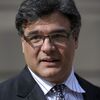Wednesday’s weekly series, In the News, is where the hosts look at the most important ongoing developments of the week and put them into perspective, today focusing on the killing of George Floyd by police in Minneapolis.
Wednesday’s regular segment, Beyond Nuclear, is about nuclear issues, including weapons, energy, waste, and the future of nuclear technology in the United States. Kevin Kamps, the Radioactive Waste Watchdog at the organization Beyond Nuclear, and Sputnik news analyst and producer Nicole Roussell, join the show.
Thousands of protestors took to the streets of Minneapolis, Minnesota last night to protest yesterday’s police killing of George Floyd. Floyd was pinned to the ground by police officers, one of whom knelt on Floyd’s neck until he stopped breathing. A witness videoed the incident and it quickly went viral. After nationwide outrage, the officers were fired, but many Minnesotans are demanding that they be tried for murder. John is joined by Michelle Gross, the president of Communities United Against Police Brutality, and Noah McCourt, executive director of the Minnesota Disability Justice Network, which focuses on criminal justice and police brutality against people with disabilities.
The first two of five Iranian tankers have arrived in Venezuela carrying much needed refined gasoline in the face of military threats by the Trump administration, which has carried out a major naval deployment in the Caribbean to “surround” Venezuela. The move represents a deepening of economic relations between Iran and Venezuela, both of which are under intense economic pressure by the United States. Brian and John speak with Mohammad Marandi, an expert on American studies and postcolonial literature who teaches at the University of Tehran.
The Gwangju Uprising in Korea, ended in a massacre 40 years ago today. The uprising began on May 18, 1980, when South Korea’s martial law government attacked university students marching for democracy by killing at least 2,000 and beating and raping thousands more. The uprising and massacre are seen as a defining moment in South Korea’s modern political history. KJ Noh, a peace activist and scholar on the geopolitics of Asia, and a frequent contributor to Counterpunch and Dissident Voice joins the show.
The European Union is planning an unprecedented $826 billion stimulus package to bring the organization’s member countries’ economies out of their coronavirus malaise. The package is the biggest in Europe’s history, far outstripping the post-World War II Marshall Plan. But is it enough to save Europe’s economy? Neil Clark, a journalist and broadcaster whose work has appeared in The Guardian, The Week, and Morning Star, joins the show.
We'd love to get your feedback at radio@sputniknews.com


